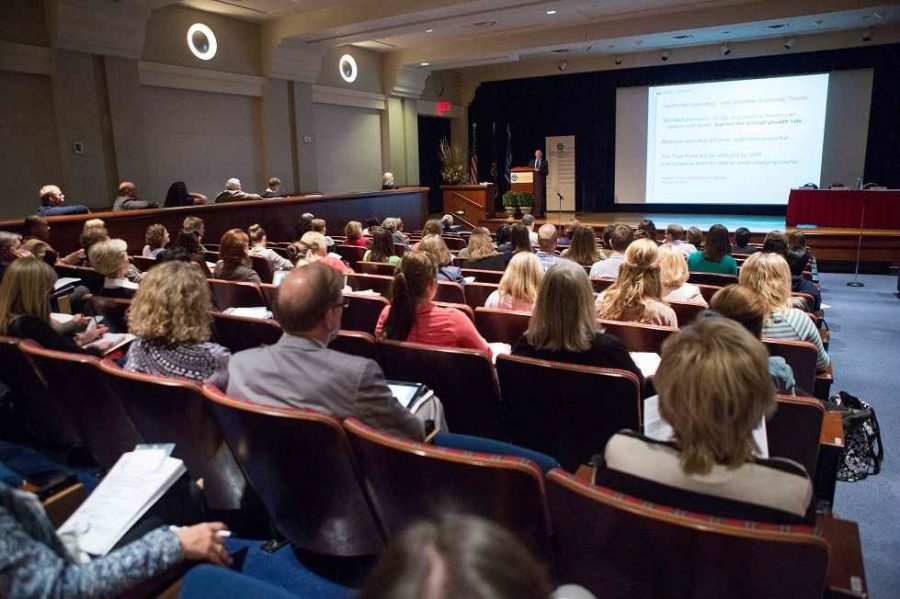Healthcare workers discuss integrating classroom ideals into practices
Feb 22, 2021
The relationship between a healthcare worker and patient is built on trust, compassion and finding the best possible solution of care. However, sometimes a patient’s religious beliefs do not align with a healthcare worker’s decision for their quality of care.
A virtual West Michigan Medical Ethics Conference and Devos Medical Ethics Colloquy will take place Monday, Feb. 22. Postponed from last spring due to the coronavirus pandemic, the theme of the conference is Waiting for a Miracle: The Role of Religion in a Patient’s Decision Making and for the colloquy, The Role of Religion in Healthcare. The virtual event will be open to the community and students, with a target for those who work in healthcare.
The afternoon session of the conference will be from 2-5 p.m. where presenters, including David Vessey, Grand Valley State University professor of philosophy, will be speaking.
“Some people experience a conflict between what are medical best practices and what their religious beliefs recommend,” Vessey said. “It’s important that practitioners know how to navigate and support patients whose religious views might lead them to reject standard treatments or request non-standard treatments.”
Following Vessey’s presentation will be an interfaith panel. Assistant professor of philosophy Jeffery Byrnes said the panel is not perfectly diverse and wished for more representation if they had more time. However, there is still a wide range of beliefs and practices.
On the panel will be Bishop Dennis J. McMurray from the Renaissance Church of God in Christ, Ali Metwalli from Western Michigan University representing the Islamic community, Reverend Mark Przybysz from Saint Anthony of Padua Parish, Rabbi David J.B. Krishef from the Congregation Ahavas Israel, and Fred Stella from the West Michigan Hindu Temple.
The panel will be given a series of situations that may occur in a hospital. With each situation, the panel will discuss the questions and concerns they have about a doctor’s perceived course of action based on their religious community and beliefs.
“The decisions that are made in healthcare connect with the most personal and intimate parts of people’s lives,” Byrnes said. “It’s inevitable that those intimate and personal parts will touch upon patient’s and the family member’s religious beliefs. All the people who work in healthcare have gone to school for years and have received very sophisticated training about how to be very good at their jobs. But that training doesn’t always prepare them for the diversity of experiences that the patients and their families will have had. The aim of the conference is to help bring to light a lot of those differences, particularly around religion, and to help the people who work in healthcare understand the role those differences play in the very care that they give.”
The expert panel will involve the morning and colloquy speakers from the day to weigh in their solutions when given complex medical situations where religion plays a role in the decision.
“The expert panel will be asked to weigh in in much greater detail about how to think about the role of religious decision making,” said Byrnes.
In the evening from 6-8:10 p.m., the colloquy speakers include Ana S. Iltis, professor of philosophy and director for the Center for Bioethics at Wake Forest University, and Ryan Nash, a director of the Ohio State University Center for Bioethics at the College of Medicine and physician.
“The Colloquy committee has invited local, regional and national experts to discuss critical ethical issues and implications for caring for patients,” said GVSU Vice Provost of Health Jean Nagelkerk. “The focus of the discussion will be how a patient’s religion plays a role in the medical treatment and decision process. We expect the conversation to provide both a research and a clinical perspective of the topic.”
Decisions made in healthcare are not as black and white as people may think. Byrnes believes there is a lot of value for students at events like this.
If students are involved in healthcare, many of their future co-workers will be involved in this event. Even for students not involved in healthcare, Byrnes thinks students will benefit in seeing how the ideals that happen in classrooms are put into work outside the university.
“Decision making about important things is more complex than the typical fact and opinion categories that sometimes we divide those decision making into,” Byrnes said. “We tend to say some decisions are based on facts and some decisions are based on opinions and we have this subtle, over-simplistic view and decision making about really important things like healthcare, like the end of people’s lives, is much more complex than merely a fact and opinion decision. Some decisions are based on deep commitments that we have and are connected to our identities. If we live in a diverse society, then our institutions like hospitals have to be able to respect those differences and learn how to respect them even better.”























